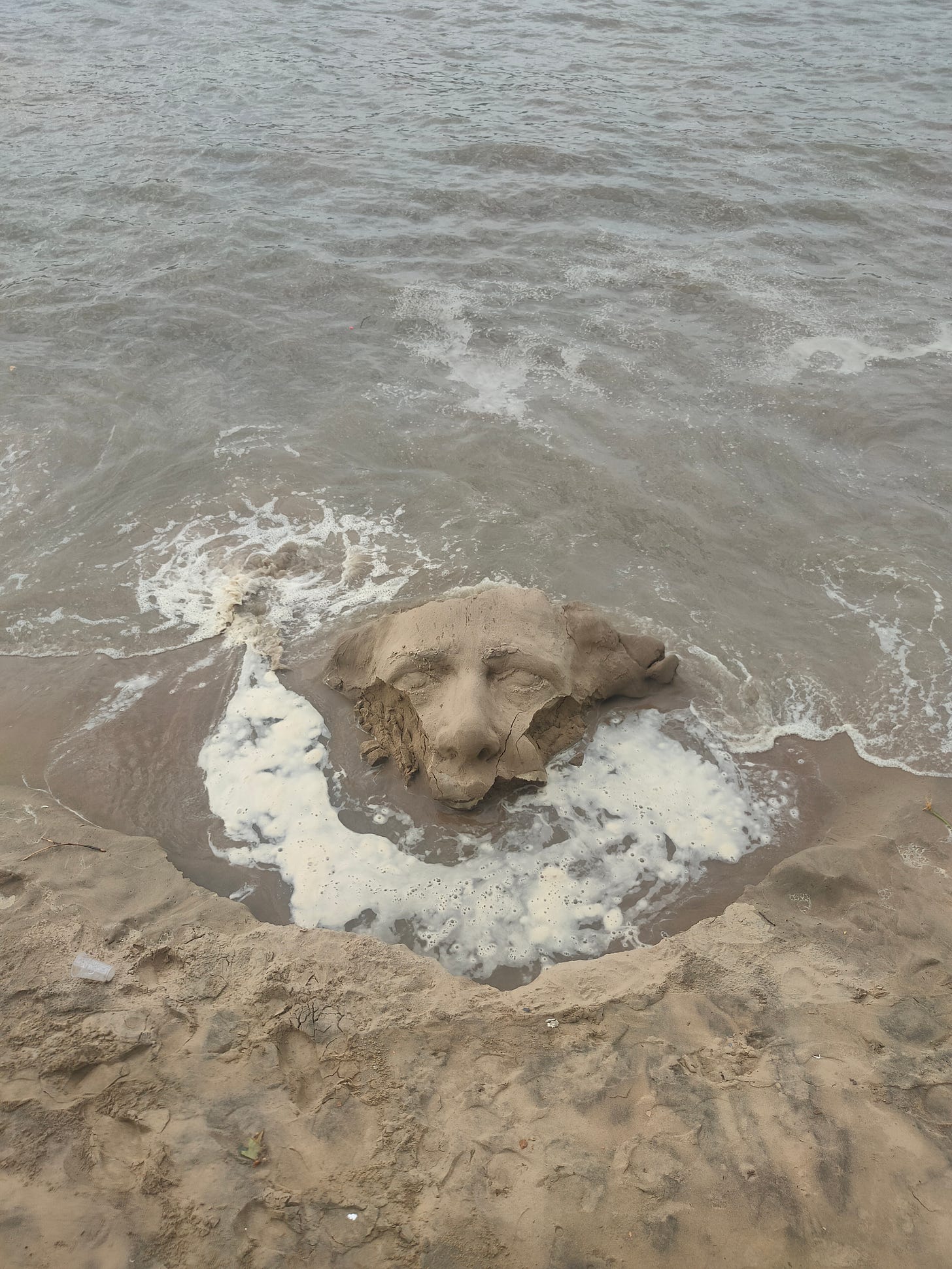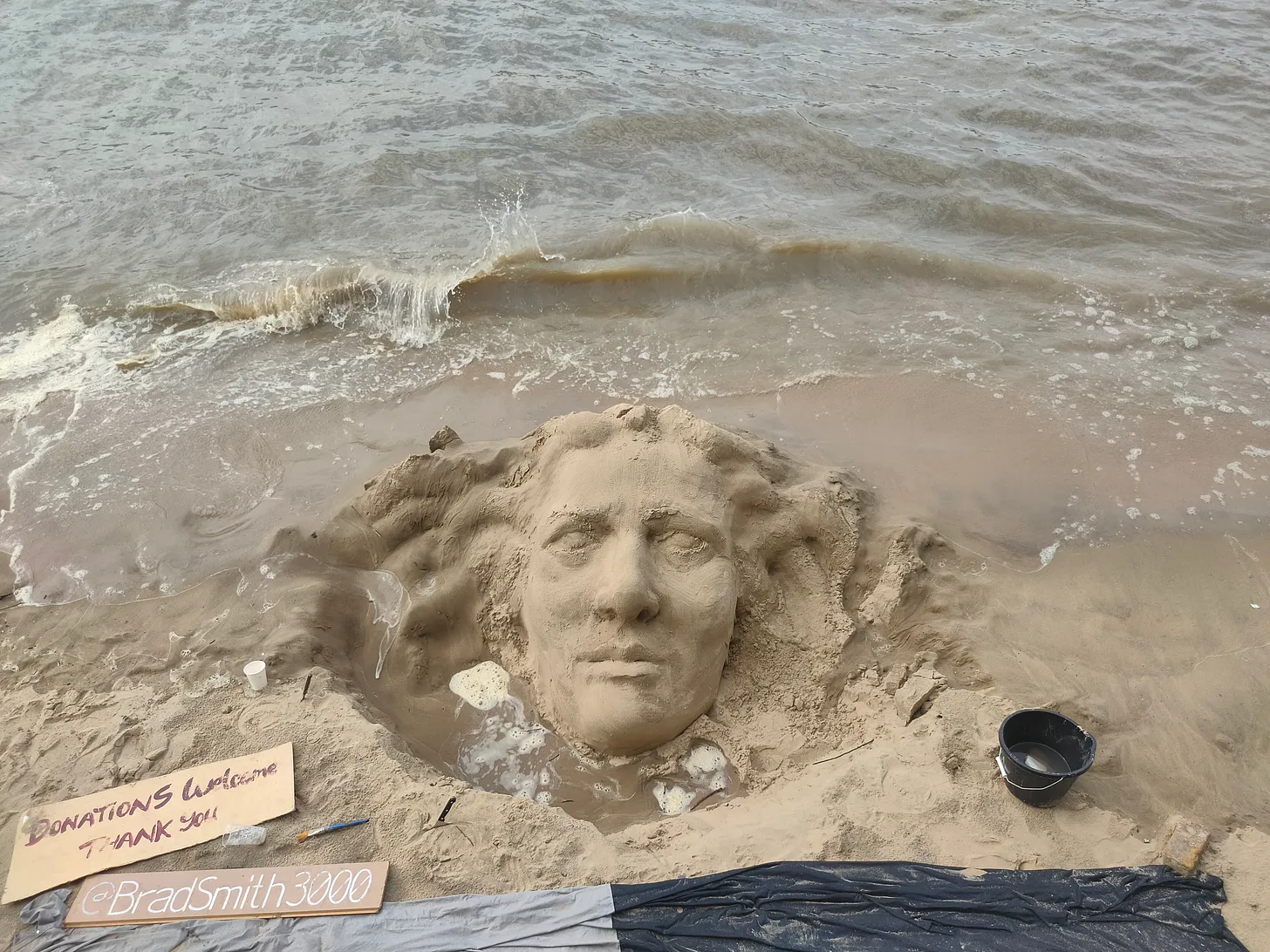A few weeks ago Miranda and I were walking back from the White Cube in Bermondsey, where we’d seen an exhibition called Finnegans Wake by Anselm Kiefer (very spooky, like Tom Waits had gone mad in an apocalypse and started collecting things and piling them up real high), and came across an artist on the South Bank called Brad Smith who had spent the last 5 hours carving a giant face into the sand. As we passed, he got up from the trench in which he’d been working and dropped his knife on the sand and came over to the railing to talk to us.
“She’s done now,” he said. I asked him how long she’d last before the tide ate her. I asked if it would be an hour or so. He shook his head. “Thirty minutes. Twenty minutes, maybe, and she’ll be gone.”

We talked for twenty or thirty minutes or so about art. We told him what we both did, and asked him how he’d ended up doing what he did. He talked about teaching people how to draw, and about impatience. He talked about meeting students who wanted to draw like that and couldn’t deal with the fact that currently they were only able to draw like this. He told us that he’d started encouraging his students to draw with their eyes closed, and that when he did it for the first time, he opened his eyes to see what he’d done and immediately thought “I’ve been trying to draw like this my entire life.” He talked about how what you actually want to do is inside you, waiting to come out, and it just wants you to communicate with it instead of reaching for something else.
After a while, he started adopting an interesting habit of talking in the collective first person, as though we had become extensions of him. He seemed to recognise something in us that spoke enough to something in him that he could now authoritatively speak on behalf of all three of us. Weirdly enough, this didn’t feel presumptuous to me. I agreed with more or less everything he told me about myself.
“We don’t do this because we’re trying to make anything that lasts, or survives,” he said. “We’re not doing it because we’re trying to get anywhere, or acquire anything. We get tricked into thinking that way, but it’s not why we do it. We do it because we do it. We do it because we feel differently to everyone else, and this is the only thing that makes sense. We see it in our heads, so we have to make it real, because nobody else sees it in their heads. I’m autistic, obviously, and so are you two, obviously, or you’re neurodiverse, or something, because you have to be to do this…” (at this point I’ll step outside of the narrative to say that this feels like an oversimplification to me – I don’t think you have to be neurodiverse to make art, but I take his point that in order to want to make art, you have to feel somehow different from the things life shows you and asks you to accept. You have to have had that feeling of looking around and sensing that the thing you want to exist doesn’t exist in the reality you see, so you have to create it). “But nobody else understands. People stop and they ask me why I spend so many hours making it when it just disappears, and I can tell the difference between the people who understand it and the people who just find it baffling. But I feel different. I have to do it. Because nobody told me how to make sense of all the ways I felt different when I was a kid, so now I do this because it helps it all make sense.”
And then the tide broke over the crest of his sculpture and started gushing down its face and pooling around its chin, and its cheeks and jaw began to crack and gradually started being sucked into the earth by the water pooling beneath them, and I don’t know why but I started crying. Not because I was sad to see her go – she had to go, that was the point of her – but because what I’d heard felt very true to me, and sometimes, when you’re unexpectedly reacquainted with a part of yourself that you haven’t fed for a while, it can feel like the floor has been pulled out from beneath you. Like the sea is gathering under your feet and sucking you down.

The creative industries are obsessed with achievement. They’re obsessed with progress. They’re obsessed with markers of success. They’re obsessed with all these external forces that draw us out of alignment with the impulse that first made us decide we wanted to try and lead a creative life – “The thing I want to exist does not exist, so I have to make it, because if I don’t then the world doesn’t make sense to me.”
I’ve spoken before in this newsletter about the fact that I dislike the “magical thinking” around creativity, and I hope I’m not at risk of falling into it here. I think leading a creative career is a choice you make, and a job you can do, and a skill-set you can work at. I don’t think anybody is more or less “destined” to do it than anybody else, and that’s why I think Brad’s comment about needing to be neurodiverse in order to do it is a bit wide of the mark. But like all choices, it’s a choice that stems from a feeling – the feeling is “I must do this. Because it’s what I’d be doing anyway.” As long as that feeling remains true, then a creative career is the thing you will do in the world. As soon as it stops being true, then that will no longer be the right path for you, and something else will start to look better. And if there’s one thing that can kill that feeling more than any other, it’s the over-identification with those externals. It’s the insistence that this thing you built must survive, must last, must outlast even you. It’s the desperation to hold back the tide.
I’ve hinted at it often enough in this newsletter, and have always tried to focus on the positive rather than dwelling on the negative, but this year has been a bit difficult for me creatively. It’s been the end of one large cycle and the start of another. I’ve begun many projects, and none have come anywhere close to being finished products I can take pride in yet, and few are likely to by the end of the year, even. I’ve tied myself in knots wondering why the next thing hasn’t landed in my lap as a reward for all the work I did in that previous cycle, and why instead I’m having to explore in the bushes at the side of the road to find the seeds that will grow into the next cycle. All of these negative thoughts have been focused on the idea of creativity as a process that takes me somewhere and gives me things. They’ve been about externals. They’ve not been authentically in touch with the feeling that first got me doing this – “I must do this, because it’s what I’m already doing.” Watching the sea eat away at the face Brad had made reminded me of what I’m actually doing this year. The tide has come in. The castles I built have turned back into sand. I am building new castles. It will be many hours until they’re done. Then the sea will eat them again. Then I will build new castles. Then the sea will eat them again. Then I will build new castles.
A Cool New Thing In Comedy – I talked about the Edinburgh Fringe last week, so this week, some live recommendations for those who are in London for the month instead of heading north! Soho Theatre is hosting some great shows over the next couple of weeks, like Ed MacArthur and Kiell Smith-Bynoe’s kids’ show for adults String v SPITTA, or Crybabies’ double bill of their two sketch magnum opuses, Danger Brigade and Bagbeard.
What’s Made Me Laugh The Most – I saw Stevie Martin’s work-in-progress at Soho this week and it’s full of delightfully stupid ideas, but her story about eating dried apricots got me like nothing else.
Book Of The Week – I’ve been reading Chris Hadfield’s An Astronaut’s Guide To Life On Earth: Life Lessons From Space, which does exactly what it says on the tin. So far his advice is to always think about the worst thing that could happen to you, and plan for that, but also to think about the best thing that could happen to you, and plan for that. Sounds exhausting.
Album Of The Week – Joni Mitchell At Newport. This is a recording of Joni’s surprise live comeback at Newport Folk Festival last year, in which various “Joni Jam” guest musicians help her recreate her hits. I’ll be honest, I find the Joni Jam singers a bit cloying and saccharine and performatively delighted to be there, and I occasionally find myself wishing they’d shut up and let Joni Mitchell sing more. But when they do let her sing, it’s so heart-stoppingly good that even they can’t stop me from thinking this album is just a delight.
Film Of The Week – Oppenheimer. This is great. It’s not as good as Barbie, obviously, and it made me come out thinking “Well I loved that but I’ll never watch it again,” as opposed to Barbie’s “I can’t wait to see it again!”, but it is brilliant. My only criticism was that I had been led to believe that the big bang noise in the bomb scene was going to be much louder than it was, and I felt silly visibly holding my breath and covering my ears for a full minute and warning everyone around me to do the same.
That’s all for this week! As ever, please let me know your thoughts, and if you enjoyed this newsletter enough to share it with a friend, or encourage others to subscribe, then that would be hugely appreciated! For now, take care of yourselves until next time, and all the best,
Joz xx
